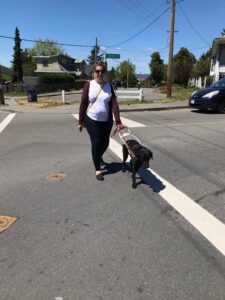
Editor’s Note: This is the third part in a three-part series on ableism. Part 1 of the series discusses the question: “What is ableism?” Part 2 examines the types of ableism. Part 3 discusses ableist micro-aggressions and how we can combat ableism.
What Are Ableist Micro-Aggressions?
Negative language and rhetoric about individuals and/or groups of people is very harmful. Phrases and words can deeply impact individuals these comments are directed towards. People who have disabilities can often experience ableist attitudes and micro-aggressions. According to Elsenmenger (2019), micro-aggressions are: “everyday verbal or behavioural expressions that communicate a negative slight or insult in relation to someone’s gender, identity, race, sex, disability…” (What are ableist micro-aggressions?, para. 1). The author further provides examples of ableist micro-aggressions such as: “That’s so lame”, “It’s like the blind leading the blind”, “She’s so psycho”, and “I don’t ever think of you as disabled” (Elsenmenger, 2019, What are ableist micro-aggressions, para. 1). Typically, when people use phrases like this, they are unaware of the diction they are using and how they can be very harmful (Ravishankar, 2020). Rhetoric of this nature insinuates that having a disability makes an individual inferior, disability is perceived as negative, or disability is an issue that needs “fixing”. The majority of people do not mean to harm or insult others. However, even words that come from a good place can deeply affect individuals (Elsenmenger, 2019). It is imperative for members of society to be aware of the language we use when communicating with others..
What Can We Do to Combat Ableism?
Although Western culture in recent years acknowledges the need for a more equitable, diverse, and inclusive society, much more needs to be done. Ableism is so embedded in the fabric of our culture that it is challenging to completely eradicate prejudicial attitudes and discrimination. We can all do our part to contribute in creating positive change. Social change takes time, but if we all work together we can help to make a difference.
Elsenmenger (2019) emphasizes the importance of averting ableism, and one key step is to consult with people with disabilities when decisions and policies are being implemented (Elsenmenger, 2019). The author further highlights other important elements to pushing back against ableist views and behaviours. These recommendations include: listening to an individual when they ask for an accommodation, not accusing an individual of falsifying their disability, not grabbing or touching a person with a disability or their mobility aid, speaking to the individual directly and not speaking on the individual’s behalf, not asking an individual intrusive questions regarding their diagnosis or disability, and making accessibility a priority when offering services and planning events (Elsenmenger, 2019, What can we do to recognize and avert ableism?, para. 1).
Being aware of our words, language, and actions can help to mitigate ableism in everyday life and society as a whole. Ravishankar (2020) provides suggestions to help reduce ableist language use and behaviours. The author accentuates the need for us to recognize disability in our society, educate ourselves and others, make a committed effort to being mindful and aware of the language we use, refrain from making assumptions about an individual or their identity, and offering a sincere apology when we make a mistake (Ravishankar, 2020). In order for positive change to occur at the micro and macro levels, advocacy needs to happen from the bottom up. It is essential for all people to be aware of social etiquette in regards to disability. Education and advocacy are key to informing the public and creating positive change. As individuals each one of us has our part to play in being instrumental.
As I reflect back on my personal experience living with a disability, I recognize my role in moving towards a society that respects, embraces, and is inclusive to all people. I acknowledge that I myself have much to learn, grow, and share with others. For me, it is vital that I educate others and the public about blindness and social etiquette. In my everyday life, I can also do my best to improve on the language and words I use in my communications. I also want to do my very best to embrace a positive philosophy of blindness and exemplify this in my words and actions.
As a collective we can come together. Whether we have a disability or not, let’s stand in solidarity and use our voices. Together we can make a change, but we must be a people of action in order to see change and equality for all come to fruition.
Tune in next week for another Saturdays with Shauna post or go back and read part 1 and part 2 of this series.
References
- Elsenmenger, A (2019). Ableism 101: What it is, what it looks like, and what we can do to fix it, Access Living, Retrieved May 28, 2020
- Ravishankar, R. A. (2020). Why You Need To Stop Using These Words and Phrases, Harvard Business Review, Retrieved May 28, 2021